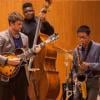
Advertised enticingly as a program of “new chamber jazz for quintets,” Friday night’s triple bill at San Francisco Community Music Center proved to be something far more interesting. Presented by Jazz in the Neighborhood, an organization dedicated to fairly compensating jazz musicians, the evening was designed to showcase three rising bandleaders as part of JITN’s Next Stage program, which provides mentorship and performance opportunities for young musicians.
Aside from the fact that the bandleaders have deep ties to the California Jazz Conservatory, the only thread connecting the three sets was that all composers assiduously avoided the enduring modern jazz cliché of a theme followed by a round of solos and a concluding return to the theme (aka head-solo-head). Brazilian born guitarist and vocalist Ian Faquini opened the concert and presented the evening’s most polished set with his Quinteto Brasiliense.
Rather than chamber jazz, Faquini writes astonishingly sophisticated Brazilian pop music in the omnivorous tradition known as MPB (música popular brasileira), which often draws heavily on jazz. Born in Brazil and raised in Berkeley, Faquini is a protégé of Guinga, the revered Brazilian guitarist and songwriter whose tunes have been recorded by dozens of MPB stars.
Faquini kicked off his set with the ravishing song “Sereia” (Mermaid), the opening track of his acclaimed 2016 debut album Metal na Madeira (Ridgeway Records), a collaboration with São Paulo vocalist Paula Santoro. While his harmonic palette is unmistakably inspired by Guinga’s writing, Faquini often draws on styles from Brazil’s northeast. His second song opened with a prelude drawn from “Assum Preto” a well-known song by iconic forró star Luiz Gonzaga, followed by Faquini’s quietly curvaceous melody.

Though he’s the only Brazilian musician in his band, Faquini has connected with American artists steeped in an array of Brazilian styles. His quintet features a particularly impressive array of talent with Natalie Cressman on trombone and vocals, Brian Rice on percussion, Scott Thompson on electric bass, and flutist/vocalist Rebecca Kleinmann (who also performs and records with Faquini in a duo).
A jazz-steeped waltz featuring a lyric that Guinga wrote for Faquini’s music offered another sumptuously orchestrated passage. With the two and three-part vocal harmonies hugging the Brazilian-accented Portuguese and warm voicings for alto flute and trombone, Quinteto Brasiliense felt like a much bigger ensemble. This band is ready for the recording studio.

Like Faquini, pianist/flutist Erika Oba is a graduate of Berkeley High. She presented the evening’s rawest set with the debut of her powerhouse Ends Meat’ Catastrophe Jazz Ensemble (the name sounds like an apocalyptic vegan collective but the moniker reflects the merger of two earlier bands). Premiering what she called a chamber jazz suite, Oba instead delivered a beautiful and rambunctious set of interconnected songs rendered with poise and passion by gifted Virginia-based vocalist Rachel Austin.
Featuring the Bay Area players Eli Maliwan on tenor sax, drummer Daria Johnson and bassist Chris Bastian, Ends Meat’ is a formidable ensemble that rendered Oba’s songs with finely calibrated dynamics before launching into extended improvisation. Pivoting between Bastian’s lyrical, bowed lines and Oba’s insistently percussive piano, the incantatory jazz songs left plenty of space for Austin to interact with the band. When it came time to deliver Oba’s tale of moon-besotted passion, Austin interpreted the lyrics with simmering drama that left me wanting to hear the next iteration of this work in progress.
Two thirds of the way into the concert it was clear that the event didn’t line up with its billing. Musicians and writers often use the term chamber jazz to refer to groups that play with a narrower dynamic range and more elaborate arrangements than usually found in jazz, a la the Modern Jazz Quartet. The term also encompasses ensembles that include instruments outside the usual hard hop arsenal, like the Billy Childs Chamber Jazz Ensemble (and of course expanded instrumentation and detailed scores often go together).

Drummer Dillon Vado, who, like Faquini, graduated from the California Jazz Conservatory, closed the concert with the debut of his new band Never Weather featuring trumpeter Josh Reed, alto saxophonist Aaron Wolf, guitarist Justin Rock, and bassist Tyler Harlow. His music is heady and intricate but never over-thought or busy. His brief introductions provided a welcome window into the tunes, which often sought to (and succeeded in), evoking complex ideas and unusual situations, like the episodic opener “Blissonance,” a recently coined word describing the pleasure of being in a special place and realizing your presence damages the location.
Vado’s tunes flow from passage to passage, and solos serve as transitions or provide commentary on the passing scene. His noir-tinged piece “Bring Back the Color” centered on Wolf’s sinuous alto solo, which led to a taunting response by the full ensemble. He closed the concert with “Never Catch Up,” a kinetic, headlong piece that displayed Vado’s intense rhythmic connection with Harlow.
Anyone despairing about the fate of jazz could have come away from the Power of Five feeling reassured. With three smart, resourceful and idiosyncratic composers and bandleaders pursuing very different visions, the music’s future sounds interesting indeed.




